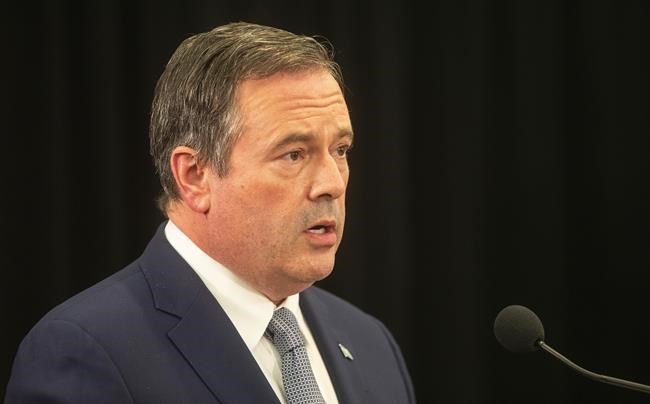WASHINGTON â Alberta Premier Jason Kenney and oilsands industry executives are in the U.S. capital as part of a fresh push to rehabilitate the public image of sa¹úŒÊŽ«Ãœ's fossil fuels.
At the core of their effort is the Pathways Alliance, a coalition of oilsands producers â originally christened the Oil Sands Pathway to Net Zero Alliance â with an ambitious and expensive plan to capture and store all of the industry's greenhouse gas emissions by 2050.Â
So-called "in-situ" producers, which these days comprise the bulk of oilsands production, inject steam into the ground to liquefy the bitumen, making it easier to extract. The emissions are a byproduct of burning natural gas to generate the steam.
The alliance is proposing a multibillion-dollar carbon capture and storage system that would collect those emissions from more than 20 oilsands facilities, transporting and storing them deep in the porous soil and rock of the Canadian Prairies.Â
That's the long-term goal, with the aim of capturing 20 million tonnes of emissions a year by 2030. The immediate goal is to convince the world, beginning with lawmakers on Capitol Hill, that the oilsands can be part of the solution to climate change instead of part of the problem.Â
"Right now, we have a label of, 'sa¹úŒÊŽ«Ãœ has dirty oil,'" said Rhona DelFrari, chief sustainability officer at Cenovus Energy, one of the six Canadian producers that comprise the alliance, representing 95 per cent of all oilsands production.Â
"We want to completely erase that label and instead have people around the globe saying, 'sa¹úŒÊŽ«Ãœ is producing oil like the rest of the world should be producing oil.'"
It won't be cheap: DelFrari said the industry expects a final tab of about $2.5 billion a year between now and 2050, including roughly $20 billion to meet that initial target of storing or otherwise eliminating 20 million tonnes of emissions by 2030.Â
And companies have already indicated that they won't foot the bill alone.Â
Cenovus CEO Alex Pourbaix told analysts back in April that the federal government's new suite of tax credits for carbon capture projects simply won't be enough to provide the sort of long-term stability required to placate nervous investors.
The oil and gas industry is cyclical enough as it is, not to mention the additional political and social uncertainty that now seems to be part and parcel with fossil-fuel infrastructure projects like pipelines and refineries, advocates say.Â
"Our companies will not be able to move forward with these types of multibillion-dollar projects unless there is partnership with governments," DelFrari said.
"Canadians have said that they want sa¹úŒÊŽ«Ãœ to address climate change and they want a strong economy. To achieve both of those things, the Pathways Alliance and the partnerships between the private sector and the government have to happen."
That's despite an earnings season replete with eye-popping profits.Â
Suncor reported quarterly profits of $2.95 billion, up from $821 million during the first quarter of 2021. Cenovus earned $1.6 billion in the same period, up from $220 million last year. And a 68 per cent revenue surge helped MEG Energy Inc. to cash-flow records and $362 million in quarterly earnings.Â
But the federal and provincial governments are also beneficiaries of a healthy oilpatch, and stand to gain from one that can reduce emissions while continuing to produce energy, said Mark Cameron, the alliance's vice-president and senior adviser.Â
"The two alternatives really are, you can invest in technology to reduce emissions, or you can mandate reductions in production. But that means less royalties, less jobs, less taxes, less of all of these things," he said.Â
"If it's all stick and no carrot, then there will eventually be less and less of an industry for the long run."
Kenney, just six weeks removed from his rare in-person appearance before the U.S. Senate's energy and natural resources committee, is back in town to take part in some of the meetings, including a roundtable event Thursday hosted by the Wilson Center.Â
That event will also include Pourbaix,  ConocoPhillips sa¹úŒÊŽ«Ãœ president Bijan Agarwal and Imperial Oil president and CEO Brad Corson, among a host of other senior oilsands executives.Â
For too long, Cameron said, the industry has allowed outsiders and critics to provide a one-sided perspective of sa¹úŒÊŽ«Ãœ's oilsands industry without countering with its own narrative, including in the U.S.
"This is a long-term game. I think not being present in Washington and New York and California and other places in the U.S. has been detrimental to our industry, because we haven't been telling our own story," Cameron said.
"The story has been told for us  by people who are presenting a one-sided view, or an inaccurate view, or a 10-year-old view, and not what's actually going on."
This report by The Canadian Press was first published June 22, 2022.
James McCarten, The Canadian Press



